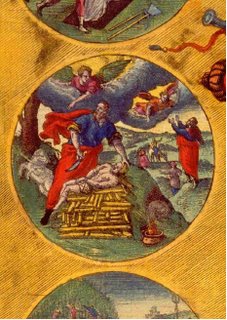
Abraham took Isaac to Mount Moriah to sacrifice the boy. It's bad enough to kill ones child, we can all imagine, but to do so even though one has no hope of another child, this child being the hope of a lifetime finally come true only to be demanded back, and worse, this very child being the link to the line of the Messiah, a link to be broken not just for the man and wife but for the whole people, then what do you do?
What do you do?
Below is a short excerpt from a philosophy professor's long letter to a student:
FEAR AND TREMBLING
By Soren Kierkegaard.
132 pages
Translated by Walter Lowrie.
Princeton, NJ: Princeton University Press, 1974
ISNN # 0-691-01962=2
Comments and notes by Bob Corbett
February 2002
While Kierkegaard concentrates on Abraham as a man of faith, I am deeply moved by Kierkegaard's analysis of what happens in this moment of radical individualism when one suspends the universal and ethical and determines value on one's own. This is the essence. Kierkegaard is for me blinded by one and only one answer: faith in God. Most existentialists take a route much more like the one which Charles Taylor says in the issue today in our world – ours in the time of this radical subjectivity. What are we to make of it? I think Kierkegaard got it right: When it comes to value we must leave the universal (it fails us) and we must become the LONE individual who in faith – but I think in faith to one's self – must determine value and truth. And Kierkegaard is 100% right that this is no light act. Any serious person does it with fear and trembling, with dread and humility at the awesome responsibility one takes upon one's shoulder's when one does this. It is not the light and trivial play that Jason Chester complained of in his early post on Charles Taylor's analysis of modern day subjectivism, when one just evades it all by trivially saying: it's all relative. Values must be created by the "I choose" and "I shall now act." But such choices are the most awesome responsibility one has in life. They are, just as Kierkegaard says of his notion of faith in the epilogue – the higher meaning of life.
As Kierkegaard says: one may stay in the ethical, the universal and have a meaningful and satisfying life. Or one may go farther and embrace in fear and trembling and in dread and awe the faith in one's own choices, facing the terrifying possibilities of being deceived and of deceiving oneself. One makes these choices – Kierkegaard's faith and my lone human choices – in fear and trembling, in dread, awe and humility, and then takes full responsibility for those choices and the life that follows from them.
On my view, Kierkegaard just analyzes one possible way to act when one suspends the ethical and universal and enters into the world of the individual subjectivity.
http://www.webster.edu/
****
We have to confront the nature of our faith, such as it might be if it is at all. There are most who refuse to question faith at all, not believing in anything, others who refuse by believing in anything that comes along. We end up with nihilists and facsist from those postions. For the rest of us who care at all about the problem we face today we will have to decide where we act as individuals and where we act as universalists. It is essential that we understand where we stand in regard to the laws.
One of our readers, Religion of Peace, sends the following link to us. Consider the link below in terms of faith.
http://islamophobic.blogspot
****



No comments:
Post a Comment